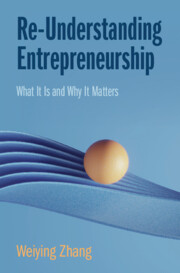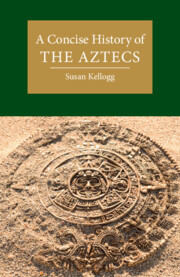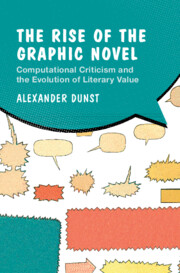163 results
Chapter 19 - Critical and Literary Theory
- from Part III - Cultural Transfers
-
-
- Book:
- Europe in British Literature and Culture
- Print publication:
- 13 June 2024, pp 306-321
-
- Chapter
- Export citation
The stuff of currency: Changing styles and uses of ear ornaments at Tikal
-
- Journal:
- Ancient Mesoamerica , First View
- Published online by Cambridge University Press:
- 09 May 2024, pp. 1-19
-
- Article
-
- You have access
- Open access
- HTML
- Export citation

Re-Understanding Entrepreneurship
- What It Is and Why It Matters
-
- Published online:
- 02 May 2024
- Print publication:
- 02 May 2024
Chapter 5 - Conclusion
-
- Book:
- The Theology of the Books of Nahum, Habakkuk, and Zephaniah
- Published online:
- 28 March 2024
- Print publication:
- 04 April 2024, pp 239-246
-
- Chapter
- Export citation
Five years in: a case study of an Australian early-career secondary school music teacher
-
- Journal:
- British Journal of Music Education , First View
- Published online by Cambridge University Press:
- 03 April 2024, pp. 1-10
-
- Article
-
- You have access
- Open access
- HTML
- Export citation
Chapter 10 - Government, Policy, and Censorship in Post-war British Theatre
- from Part IV - Theatre and State
-
-
- Book:
- The Cambridge Companion to British Theatre since 1945
- Published online:
- 14 March 2024
- Print publication:
- 21 March 2024, pp 209-228
-
- Chapter
- Export citation
18 - Value Creation and Happiness in Education
- from Part II - Ethics and Education in Practice
-
-
- Book:
- The Cambridge Handbook of Ethics and Education
- Published online:
- 07 March 2024
- Print publication:
- 14 March 2024, pp 373-399
-
- Chapter
- Export citation
17 - Civic Signs
- from Part III - Other Signs
-
- Book:
- Chinese Signs
- Published online:
- 29 February 2024
- Print publication:
- 07 March 2024, pp 160-168
-
- Chapter
- Export citation
16 - Advertising
- from Part III - Other Signs
-
- Book:
- Chinese Signs
- Published online:
- 29 February 2024
- Print publication:
- 07 March 2024, pp 149-159
-
- Chapter
- Export citation

A Concise History of the Aztecs
-
- Published online:
- 08 February 2024
- Print publication:
- 15 February 2024
Chapter 6 - The Place of Values in Virtue Science
- from Part II - Psychological Resources and Prospects
-
- Book:
- The Science of Virtue
- Published online:
- 11 January 2024
- Print publication:
- 01 February 2024, pp 150-174
-
- Chapter
- Export citation
Expanding the Scope of Institutional Logics Research
-
- Journal:
- Management and Organization Review / Volume 19 / Issue 6 / December 2023
- Published online by Cambridge University Press:
- 05 January 2024, pp. 1185-1188
-
- Article
-
- You have access
- Open access
- HTML
- Export citation
Honorific mismatches of coordinate subjects in Korean
-
- Journal:
- Canadian Journal of Linguistics/Revue canadienne de linguistique / Volume 68 / Issue 3 / September 2023
- Published online by Cambridge University Press:
- 24 November 2023, pp. 462-485
-
- Article
- Export citation
Volatile properties: A Modest Proposal revisited
-
- Journal:
- Finance and Society / Volume 9 / Issue 3 / 2023
- Published online by Cambridge University Press:
- 09 November 2023, pp. 75-90
-
- Article
-
- You have access
- Open access
- Export citation
Value models: Finance, risk, and political economy
-
- Journal:
- Finance and Society / Volume 1 / Issue 2 / 2015
- Published online by Cambridge University Press:
- 09 November 2023, pp. 1-22
-
- Article
-
- You have access
- Open access
- Export citation
Terminal value: Building the alternative Bloomberg
-
- Journal:
- Finance and Society / Volume 2 / Issue 2 / 2016
- Published online by Cambridge University Press:
- 09 November 2023, pp. 138-150
-
- Article
-
- You have access
- Open access
- Export citation
5 - “Great” American Graphic Novels
- from Part I - History and Genre
-
-
- Book:
- The Cambridge Companion to the American Graphic Novel
- Published online:
- 10 January 2024
- Print publication:
- 28 September 2023, pp 89-105
-
- Chapter
- Export citation
4 - Techno-Racism, Manual Labor, and Du Bois’s Ecological Critique
- from Part II - Reproduction through Popular Rule of Labor/Nature
-
- Book:
- Democracy and Empire
- Published online:
- 24 August 2023
- Print publication:
- 07 September 2023, pp 133-166
-
- Chapter
-
- You have access
- Open access
- HTML
- Export citation
Chapter 1 - Introduction
-
- Book:
- Plato's Moral Realism
- Published online:
- 28 July 2023
- Print publication:
- 24 August 2023, pp 1-28
-
- Chapter
- Export citation

The Rise of the Graphic Novel
- Computational Criticism and the Evolution of Literary Value
-
- Published online:
- 06 July 2023
- Print publication:
- 20 July 2023



